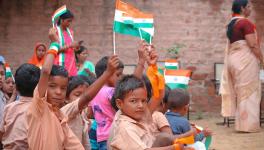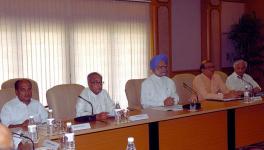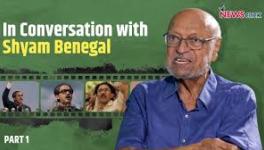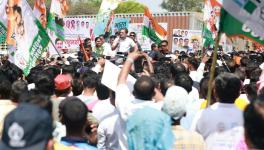Uttar Pradesh Election: BJP Shaking the Foundations of Truth in Varanasi?
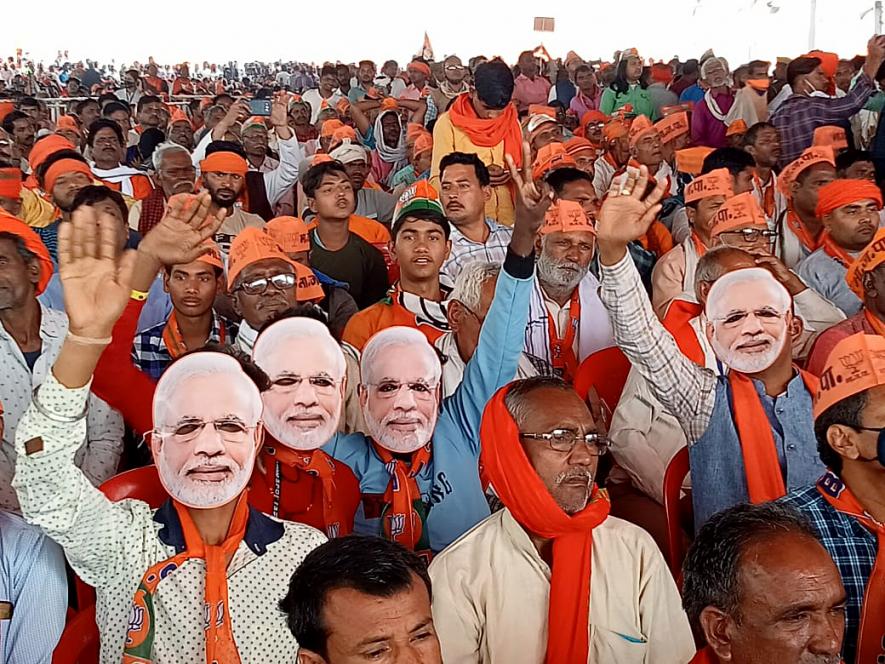
Varanasi, Mar 05 (ANI): Bharatiya Janata Party (BJP) supporters wearing cutouts of Prime Minister Narendra Modi attend a public rally by PM Narendra Modi for the seventh and last phase of Uttar Pradesh Assembly elections, at Khajuri Village, Rajatalab, in Varanasi on Saturday.
On 6 April 1930, standing on the banks of the Arabian Sea, Mahatma Gandhi picked up a lump of salt, held it in his fist, and said, “With this, I am shaking the foundations of the British Empire.” The Dandi March, part of the civil disobedience movement, was a turning point in history that culminated in India’s freedom from British rule. Seventy-five years after independence, salt politics—albeit entirely different—is re-playing in Varanasi and around. Not Gandhians but the Bharatiya Janata Party (BJP) is using the symbolism of salt this time. The party ruling Uttar Pradesh has pinned its hopes on packets full of salt to trounce its rivals and return to power.
Under the PM-GKAY or Pradhan Mantri-Garib Kalyan Anna Yojana scheme, the Uttar Pradesh government has been distributing salt packets, food grains, refined oil, and pulses through ration shops. Earlier, the packets of salt had a photograph of Prime Minister Narendra Modi and Chief Minister Yogi Adityanath, which indicated that they are providing these supplies to beneficiaries. Some of the packets even had the slogan “soch imandaar kaam damdaar”, one of the BJP’s campaign slogans.
Once the Model Code of Conduct kicked in, the photographs were removed, but the Pavlovian association had been formed by then. The BJP has been harping on the longstanding cultural association among Indians of salt with loyalty. Practically every BJP leader across the eight Varanasi segments that will vote on 7 March has told voters, ‘Hamara namak khaya hai, hamey dhoka nahi dena—we gave you salt [food], now you must vote for us.’ The phrases “namak haraam” or treacherous and “namak halaal”, which means loyal and faithful, are resounding across the labyrinthine streets of the vibrant city of Varanasi.
Prime Minister Narendra Modi began this salt charge when he claimed at a rally in Hardoi that villagers in Uttar Pradesh were saying, ‘Hamney Modi ka namak khaya hai, hum Modi ko dhokha nahi dengey’. He seemed to say, those who took rations must vote for his party.
Wannabe and sitting BJP legislators such as Neelkanth Tiwari, contesting on the Varanasi South seat for a second time (pitted against the Samajwadi Party’s Kishan Dixit), do not hesitate before reminding the public during their rallies not to be “namak haraam”. In other words, they want people to repay the debt of the salt they have consumed in votes.
However, people know the ration scheme was extended last November primarily because of the Assembly election and that its benefits only last until Holi, due in mid-March. Still, BJP workers have made the salt analogy as malleable and ductile as possible. They are stretching the comparison to such an extent that they now claim salt in rations saved millions from hunger and that its symbolism is even more potent than the real satyagraha Mahatma Gandhi led.
The comparison is horrifying if you ask Prof Dipak Malik, director emeritus of the Gandhian Institute of Studies, Varanasi. “The BJP is expert at spreading obscurantist thought,” he says. Malik is reminded of a similar whisper campaign the RSS [Rashtriya Swayamsevak Sangh] had spread when Indira Gandhi became the prime minister in 1966. At the time, he says, the RSS blamed her for the acute food shortage in the country. “They have a huge whisper machinery, and it went from village to village, telling people Indira Gandhi was a widow and she would reduce the whole country to ash as she had her husband,” says Malik. The campaign was a blatant falsehood but had the momentum of a fable or folklore, especially among the uneducated and superstitious.
When he noticed the RSS’s obscurantist campaign was taking wing, Ram Manohar Lohia decided to combat it. He said the public can ride on a train from Calcutta [Kolkata] to Amritsar to debunk the myth that connected Indira Gandhi’s widowhood with famine. Says Malik, “The trains would pass through seven Opposition-ruled states, and people could see all of them were facing similar food shortages.”
To Malik, the BJP understands the folk culture and rural psychology, and the Opposition “needs to learn from its tactics”—but there is not a grain of truth in their association of the Salt Satyagraha with the salt distribution scheme. “It is just dramatics… The BJP is making the public feel obliged to vote for them,” he says. He says it is just one more tactic alongside the 300 YouTube channels that have been spouting pro-government propaganda in the run-ups to voting days.
From the BJP quarters is a slew of disinformation about Gandhi, first prime minister Jawaharlal Nehru, and the legacy of all previous governments. They are spreading this misinformation in Uttar Pradesh when the critical electoral issue ought to have been how the central and Uttar Pradesh governments are trying to capture all Gandhian institutes across the country. Under its watch, institutions have turned away from Gandhi’s vision, or historical sites associated with Gandhi have had to close.
Malik’s institute, spread over four acres in the Rajghat area of Varanasi, is itself at a standstill because the government wants to use its land to build a five-star hotel. “Our Institute has been forcibly shut down and the matter is pending before the court,” he says. “The illegal takeover of the institute has forced us to shut down one of Asia’s best social sciences libraries. We pleaded several times with the government to restart the library because many of our rare books and manuscripts are getting spoiled, but to no avail,” he says.
While the party that shuns Gandhi’s legacy tries to use his most prominent Satyagraha to capture votes, the Opposition has countered with its own narrative. Some leaders have said that in the Indian tradition, salt, once given to someone in need, is never taken back. Varanasi-based Aflatoon Desai, the grandson of Gandhi’s personal secretary Mahade Desai, says, “In eastern Uttar Pradesh, we don’t believe that giving salt is doing someone a favour.”
Earlier, the Samajwadi Party had launched its version of the psychological contest when it had thousands of farmers in western Uttar Pradesh pledge over foodgrains to vote the BJP out in this election. Nobody can say which party will win this psychological battle over voters, but even the Congress party has countered the claims of the BJP over free rations by insisting it aims to empower people and not make them dependent. For the people of Varanasi, this battle is going down to the wire.
The author is a freelance journalist. The views are personal.
Get the latest reports & analysis with people's perspective on Protests, movements & deep analytical videos, discussions of the current affairs in your Telegram app. Subscribe to NewsClick's Telegram channel & get Real-Time updates on stories, as they get published on our website.










